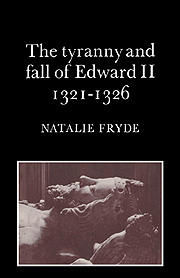Book contents
- Frontmatter
- Contents
- Preface
- Abbreviations
- 1 Problems and sources
- 2 Introduction: The king and the magnates before 1318
- 3 The rise of the Despensers
- 4 The civil war, 1321–2
- 5 The aftermath of the civil war: Imprisonments and executions
- 6 The aftermath of the civil war: Confiscations and the territorial settlement
- 7 Royal finance, 1321–6
- 8 The Despensers' spoils of power, 1321–6
- 9 The defeat in Scotland, 1322–3
- 10 The French war
- 11 The opposition to royal tyranny, 1322–6
- 12 London
- 13 Queen Isabella's invasion and the end of the regime
- 14 Edward II's deposition and ultimate fate
- 15 Epilogue: The regime of Mortimer and Isabella
- Appendix 1 Properties of the Despensers: Main facts and sources
- Appendix 2 The deposition of Edward II
- Notes
- Cited classes of records at the Public Record Office
- Sources
- Bibliography
- Index
8 - The Despensers' spoils of power, 1321–6
Published online by Cambridge University Press: 09 October 2009
- Frontmatter
- Contents
- Preface
- Abbreviations
- 1 Problems and sources
- 2 Introduction: The king and the magnates before 1318
- 3 The rise of the Despensers
- 4 The civil war, 1321–2
- 5 The aftermath of the civil war: Imprisonments and executions
- 6 The aftermath of the civil war: Confiscations and the territorial settlement
- 7 Royal finance, 1321–6
- 8 The Despensers' spoils of power, 1321–6
- 9 The defeat in Scotland, 1322–3
- 10 The French war
- 11 The opposition to royal tyranny, 1322–6
- 12 London
- 13 Queen Isabella's invasion and the end of the regime
- 14 Edward II's deposition and ultimate fate
- 15 Epilogue: The regime of Mortimer and Isabella
- Appendix 1 Properties of the Despensers: Main facts and sources
- Appendix 2 The deposition of Edward II
- Notes
- Cited classes of records at the Public Record Office
- Sources
- Bibliography
- Index
Summary
In 1324, when royal troops awaiting embarkation for Gascony were plundering the countryside because Edward was too mean to pay them, the author of the Vita castigated the king: ‘The king had plenty of treasure. Many of his forbears amassed money; he alone had exceeded them all. Howbeit, the king's meanness is laid at Hugh's door, like the other evils that afflict the court.’
While one may doubt whether the younger Despenser had much to teach Edward where meanness was concerned, it is clear that Hugh's own insatiable greed and rapacity were regarded as the mainsprings of his evil influence upon the king. There is also no doubt that horror and disgust at the Despensers' illegal seizures of land was a major cause of the fall of Edward II. Such a drastic outcome would have been less predictable if, as the chroniclers imply, they indulged in these activities merely watched by a quiescent and indulgent ruler. Edward's own greed makes it likely that he was an active participant in all their deeds and the facts confirm that, in two of the nastiest cases, that of Elizabeth D'Amory and Alice de Lacy, he was closely implicated. This being the case, there was not a landowner in England who could feel his possessions safe from their avarice or have any assurance that he was likely to be able to hand on his property to a young and defenceless heir without danger.
- Type
- Chapter
- Information
- The Tyranny and Fall of Edward II 1321–1326 , pp. 106 - 118Publisher: Cambridge University PressPrint publication year: 1979



